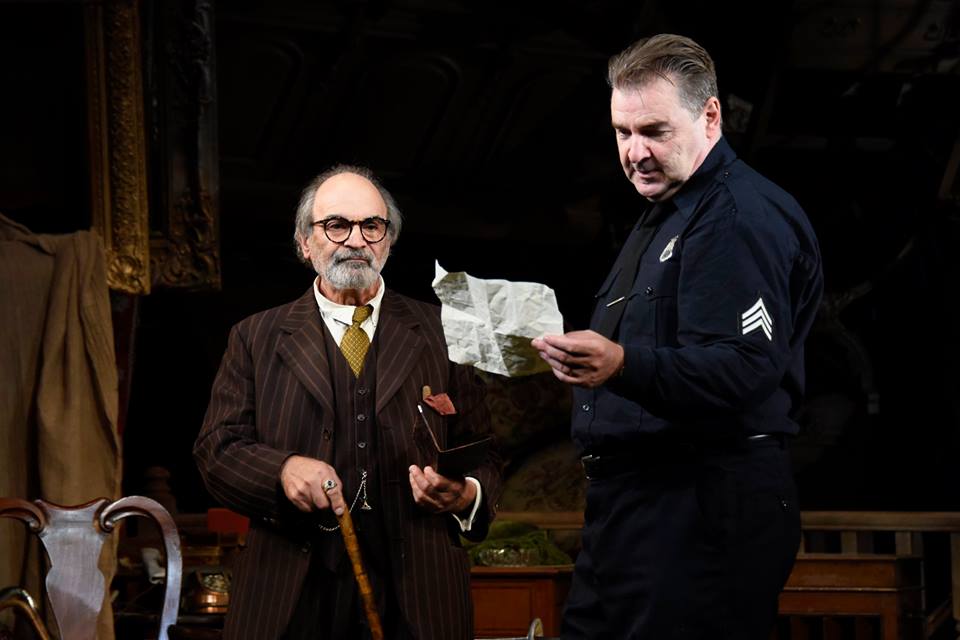
There are two senses of ‘theatrical’; one is where we mean exaggerated or flamboyant, showy, false or something similar to indicate our sense of (perhaps amused) disapproval. Another is where we acknowledge that a work or performance is most fittingly brought before the public on a stage before an audience, rather than the radio or television. Put another way, the artist involved is using the full range of skills and devices appropriate to the realization of the bespoke performance we term ‘on the night’. It is in this latter sense that David Suchet’s mesmerizing performance as Gregory Soloman is to be celebrated.
Soloman is Miller’s first ‘openly Jewish’ character in a major work and for whom he shows, through the amusement in the Yiddish argot, a certain, perhaps nostalgic, warmth. He is a creation out of the stock of characters that Miller no doubt came across in his early years via his connection to the New York Jewish milieu in which his father made and subsequently lost a small fortune as a manufacturer of coats. Like the father in the play Isadore Miller lost the lot following the Wall St crash of 1929.
As the poet considers the weight of every word so great acting considers each gesture and inflection. It operates in a realm beyond mere excellence, where it illuminates at the same time as exciting a delight for its own sake. It can be the reason and not merely a secondary consideration for going to see a play. Suchet’s Soloman is the embodiment of Lithuania in America; a man who has followed and lived out the ‘American Dream’, made money, lost it, made it again only to repeat the process but, importantly, has never given up. From his first wheezing entrance up the stairs into the attic, ‘Water I don’t need, a little blood I could use’, Suchet, with that same poet’s detail, takes on the physicality of another. Like a magician spinning his misdirection in order to pull off a trick so the eighty-nine-year-old Soloman sets about talking-down the value of the house contents he has been called in to appraise by Victor Franz (Brendan Coyle).
In a sense it is a similar misdirection to the one Miller is performing in leading us to believe the ‘price’ of the title is the value of a family’s lifetime accumulation of objects, whereas, more significantly it is the price we all pay for the choices we make in life. So much becomes clear after the appearance of Victor’s successful brother, Walter (Adrian Lukis) who had pursued his own medical career at the expense of Victor’s education. It transpires that, even worse, it need not have been the case as their father had enough money to look after himself without Victor’s sacrifice. Walter’s attempt to atone for his action is met with a kind of moral obstinacy from Victor whose moral compass directs him away from the lucrative yet legal tax dodge he suggests at the same time as declining any share in the sale of contents.
If Suchet is exceptional that is only because the level of everything else in the production is excellent. More time would have allowed me to detail the contributions of the faultless cast: the strained familiarity of long estranged brothers and the frustrated incomprehension of Victor’s wife, Esther (Sara Stewart) the elegant collateral damage of Victor’s supine acceptance of his fate.
Director, Jonathan Church, has shown a fine awareness of the moral tussle of blame and justification, which is the play’s centerpiece, allowing neither brother to gain a knockout blow whilst taking turns to make their case: Victor for not pursuing wealth, but seeking a ‘real’ life as a policeman and Walter for playing the hand he was dealt and then trying to do the right thing according to his own lights.
The two senses of ‘price’ I noted earlier come together in Simon Higlett’s attic setting. The family goods and chattels do not merely clutter the stage, they loom over it, threatening to engulf those who have come to disturb their secrets, giving a physical expression to the idea that we are always in the midst of our past.
The Price represents the main house of the Theatre Royal, under the artistic direction of Jonathan Church, flexing its creative muscles at their very best. ★★★★★ Graham Wyles 15th August 2018

